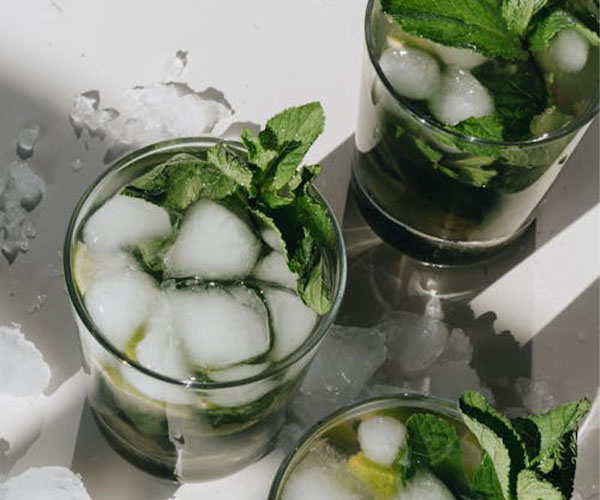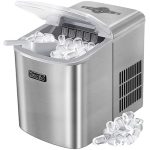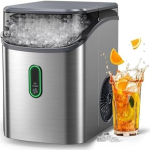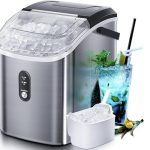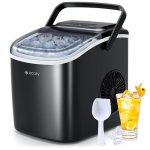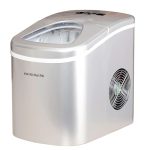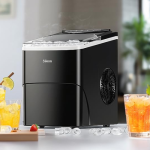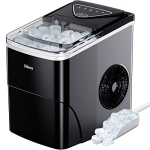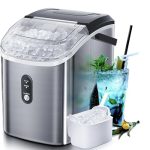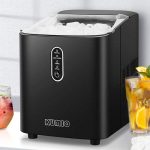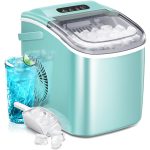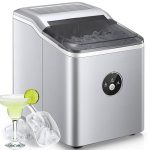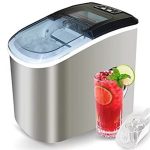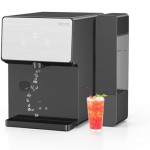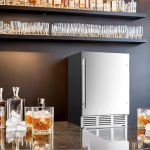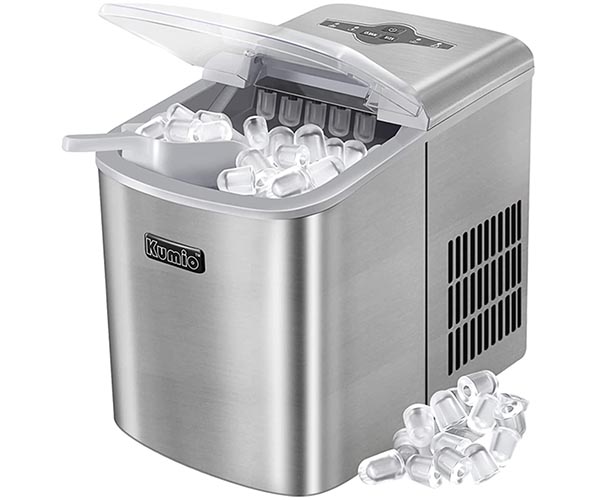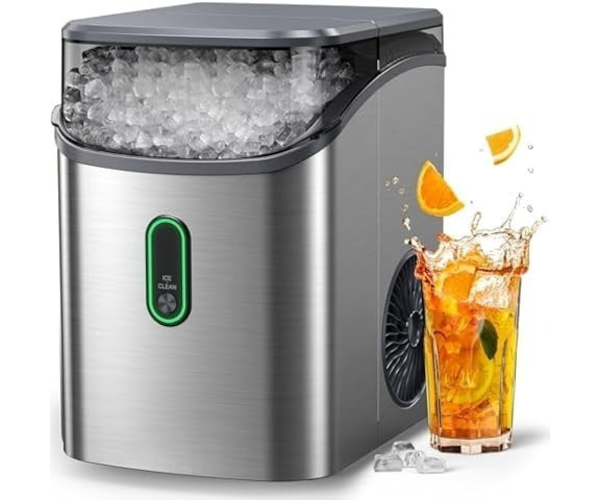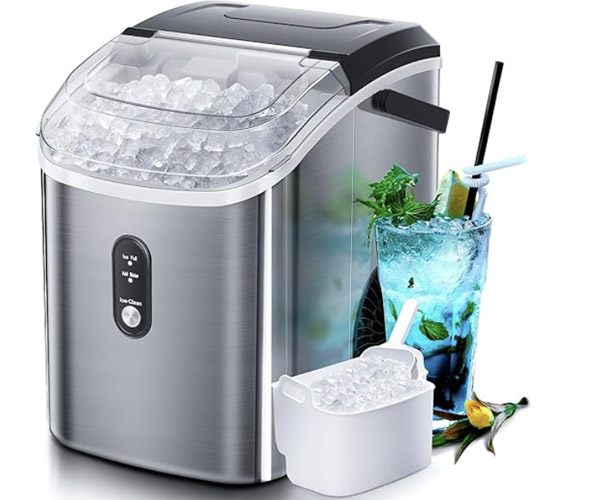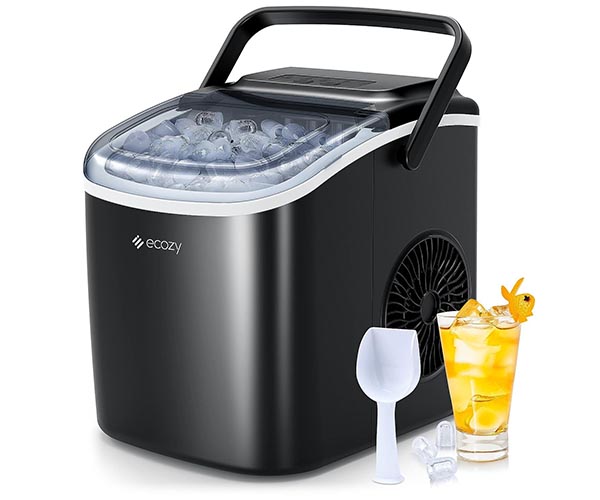Introduction
Countertop ice makers have become an indispensable appliance in many modern households and businesses, providing a convenient and efficient way to produce ice on demand. These compact devices fit neatly on most counters, offering the ability to generate ice quickly without the need for permanently installed plumbing. Their popularity has surged as they cater to a variety of needs—from serving up ice at home parties to meeting the high demands of customer service in cafes and bars.
Increasing Use in Households and Businesses:
- Convenience and Efficiency: Countertop ice makers are prized for their ability to produce ice much faster than traditional freezer trays, often churning out cubes within minutes. This convenience is a significant factor in their widespread adoption in both residential and commercial settings.
- Versatility and Portability: These units are not only easy to use but also portable, making them ideal for various settings, including outdoor events or temporary business setups. Their versatility extends to producing different ice shapes and sizes, accommodating specific preferences or drink requirements. https://amzn.to/3WoePQf
Challenges of Using Hard Water:
- Mineral Buildup: Hard water, which contains high levels of minerals like calcium and magnesium, poses a significant challenge for any appliance that uses water, including ice makers. In ice machines, these minerals can accumulate and form scale deposits on internal components, potentially affecting functionality and efficiency.
- Impact on Ice Quality: The minerals in hard water can also affect the quality of the ice produced. Ice cubes might come out cloudy, softer, or even with an unpleasant taste or smell, which can detract from the beverage experience.
- Maintenance Issues: Appliances operating with hard water typically require more frequent maintenance. For ice makers, this means regular descaling and cleaning to prevent mineral deposits from clogging the system or damaging the mechanism, which can lead to costly repairs or replacements.
Understanding the impact of hard water on countertop ice makers is crucial for anyone considering purchasing or currently owning one. This knowledge helps in choosing the right model equipped to handle hard water or implementing necessary treatments to mitigate its effects, ensuring the longevity and efficiency of the device.
Understanding Hard Water
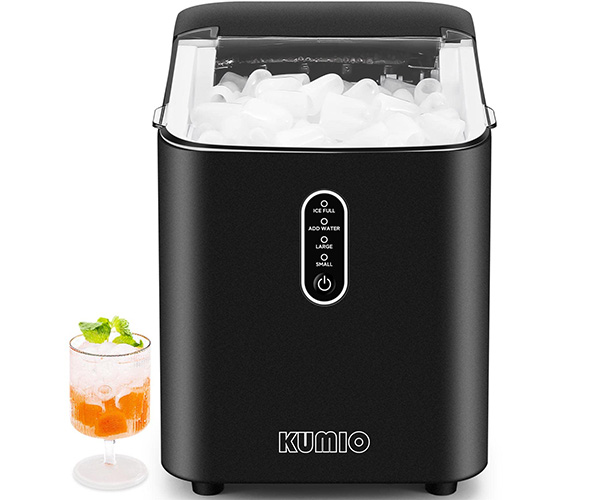
Hard water is a common issue in many geographical areas and understanding its characteristics and impact on household appliances, including countertop ice makers, is essential for effective management and maintenance.
Definition of Hard Water:
- Characteristics of Hard Water: Hard water is defined by its high mineral content, primarily calcium and magnesium, which it accumulates as it moves through soil and rock. These minerals are dissolved in the water and are responsible for the various challenges associated with hard water usage in homes and businesses.
- Comparison with Soft Water: Unlike soft water, which has a low concentration of calcium and magnesium, hard water can lead to the buildup of limescale and other mineral deposits. Soft water, on the other hand, is gentler on appliances and often preferred for uses like washing and bathing due to its lower mineral content.
Impact of Minerals on Appliances:
- Common Minerals in Hard Water: The primary minerals found in hard water, calcium and magnesium, are the main culprits behind scale buildup. These minerals are less soluble in hot water than in cold, which means that appliances like ice makers, which frequently change the temperature of water, are particularly susceptible to scale.
- Effects on Ice Makers: In ice makers, scale can accumulate on important components such as the evaporator plate, water lines, and filters. This not only reduces the efficiency of the ice maker but can also shorten its lifespan by increasing wear and tear on its mechanical parts. Furthermore, scale buildup can impede water flow, resulting in smaller, imperfectly formed ice cubes that may be cloudy instead of clear.
- Aesthetic and Functional Impact: Beyond the mechanical issues, the minerals in hard water can also affect the aesthetic qualities of the ice produced. Minerals can leave ice cubes looking cloudy and may impart a slight taste, which can alter the flavor profile of beverages.
By understanding what hard water is and how it affects ice makers, users can take proactive steps to mitigate these effects. This might include installing water softeners or using specially designed filters to reduce the hardness of the water before it enters the ice maker, ensuring that the appliance operates efficiently and prolongs its service life.
How Countertop Ice Makers Work: An Overview
Countertop ice makers utilize sophisticated technology to efficiently produce ice, adapting components typically found in larger commercial ice machines to fit compact, user-friendly designs. Understanding the general mechanics and key components involved in these devices is essential to appreciate how they handle hard water and maintain performance over time.
General Mechanics of Ice Makers:
- Freezing Technology: At the heart of a countertop ice maker is its freezing technology, which is designed to quickly convert water into ice. This process involves refrigeration techniques similar to those used in standard freezers but optimized for speed and efficiency. The water is poured into a mold or an ice tray where it is exposed to very low temperatures, rapidly freezing into the desired shape.
- Water Filtration: Considering the impact of hard water, many ice makers incorporate advanced water filtration systems to remove minerals and impurities before the water is frozen. This step is crucial not only to prevent scale buildup but also to ensure the clarity and quality of the ice cubes produced.
Key Components Involved in the Process:
- Compressor: The compressor is the driving force behind the refrigeration cycle of an ice maker. It compresses the refrigerant, which heats it up as it is condensed and then releases it into the evaporator. The compressor plays a critical role in maintaining the necessary low temperatures for ice production.
- Evaporator: The evaporator is where the actual freezing takes place. As the compressed refrigerant expands and cools in the evaporator, it absorbs heat from the surrounding environment, lowering the temperature of the water in the ice mold. This rapid cooling is essential for the formation of ice within a few minutes.
- Filters: To tackle the challenges posed by hard water, filters are an integral part of modern countertop ice makers. These filters typically reduce the hardness of the water by removing excess minerals through either carbon filtration or ion-exchange processes. Regular maintenance and replacement of these filters are crucial to prevent the efficiency losses and mechanical issues associated with mineral buildup.
The integration of these components allows countertop ice makers to operate effectively, producing ice quickly and consistently, even when using hard water. By ensuring that the water is properly filtered and that the mechanical parts are designed to cope with the challenges of mineral deposits, these ice makers can provide reliable service and maintain high-quality ice production.
Challenges Posed by Hard Water
Hard water presents significant challenges for any appliance that utilizes water, especially in devices like countertop ice makers where precision and efficiency are paramount. The high mineral content of hard water, primarily calcium and magnesium, can lead to the accumulation of scale, which adversely affects the machinery’s operation and the quality of ice produced.
Explanation of Mineral Buildup:
- Formation of Scale: As hard water passes through the ice maker, it undergoes temperature changes during the ice-making process. When hard water is heated or when it evaporates slowly at cold temperatures, the minerals dissolved in it precipitate out, forming scale. This scale primarily consists of calcium carbonate, a hard, chalky substance that adheres to the surfaces inside the ice maker.
- Effects on Machinery: Scale buildup can have a detrimental impact on the machinery of an ice maker. It can coat the internal components, such as the evaporator and the water lines, reducing the efficiency of heat transfer essential for freezing water into ice. This inefficiency can lead to increased energy consumption and longer ice-making cycles. Over time, significant buildup can also lead to mechanical failures as components become clogged or corroded.
Specific Challenges for Ice Makers:
- Scale Buildup in the Ice Mold: The ice mold, where water is frozen into cubes, is particularly susceptible to scale buildup. As scale accumulates, it can interfere with the mold’s ability to release the ice, causing ice cubes to stick or the machine to use more force than usual to eject the ice. This not only stresses the mechanical parts but can also lead to irregularly shaped or smaller ice cubes.
- Impact on Heating Elements: Many countertop ice makers use heating elements to help release the ice cubes from the molds. When scale builds up on these heating elements, their efficiency is significantly reduced. The insulating effect of scale means that more energy is required to achieve the same level of heating, which increases operational costs and can lead to premature wear of the elements.
The challenges posed by hard water are not insurmountable but do require proactive management through regular maintenance and the use of appropriate water treatment solutions. Addressing these issues promptly ensures that the ice maker continues to function efficiently, prolongs the life of the appliance, and maintains the quality of ice produced. https://amzn.to/3WoePQf
Design Features to Combat Hard Water
To effectively handle the challenges posed by hard water, manufacturers of countertop ice makers have incorporated a range of specialized design features aimed at minimizing scale buildup and corrosion. These features not only extend the lifespan of the appliance but also ensure it continues to operate efficiently and produce high-quality ice.
Materials Used in Ice Makers That Resist Corrosion and Scale:
- Stainless Steel Components: Many high-quality countertop ice makers use stainless steel for critical components such as the ice-making chamber, water reservoir, and internal piping. Stainless steel is renowned for its resistance to corrosion and scale buildup, making it ideal for use in areas with hard water.
- Food-Grade Plastics: Alongside metal components, food-grade plastics are often used in areas of the ice maker that come into contact with water. These plastics are designed to be resistant to mineral deposits and provide a smooth surface that minimizes areas where scale can accumulate.
Special Features Designed to Handle Hard Water:
- Enhanced Filtration Systems: Advanced filtration systems are crucial for countertop ice makers operating with hard water. These systems typically include multi-stage filters that not only remove particulates but also reduce the mineral content of the water before it enters the freezing mechanism. This pre-treatment of water helps prevent scale from forming on internal components.
- Self-Cleaning Cycles: To alleviate the maintenance burden and ensure optimal performance, many modern ice makers come equipped with self-cleaning cycles. These cycles are designed to flush out the system using either a strong flow of water or a specialized cleaning solution that helps dissolve any mineral buildup before it becomes problematic.
- Antimicrobial Treatments: Some ice makers also incorporate antimicrobial agents in their water handling systems. These treatments inhibit the growth of bacteria and mold, which can be accelerated by the presence of hard water minerals, ensuring the ice produced is not only clear but also hygienic.
- Programmable Settings: Recognizing the variability in water hardness across different regions, some ice makers offer programmable settings that adjust the operation based on the specific hardness of the water. This adaptive approach allows the ice maker to modify its freezing cycle and water usage to minimize the impact of hard water conditions.
By integrating these materials and features, countertop ice makers can effectively combat the detrimental effects of hard water. This proactive design approach ensures that users in hard water areas can still enjoy the benefits of having a reliable, efficient ice maker without the frequent need for repairs or intensive maintenance.
Benefits of Using Water Softeners or Filters
Implementing water softeners or filters in systems that utilize countertop ice makers significantly enhances the performance and longevity of these appliances. By addressing the root cause of many maintenance issues—hard water—these solutions ensure that the ice maker operates efficiently and continues to produce high-quality ice over its extended lifespan.
Improving Performance and Longevity with Water Softeners:
- Enhanced Efficiency: Softening the water before it enters the ice maker helps prevent the buildup of scale on vital components such as the evaporator coils and water lines. This results in better heat transfer efficiency and faster ice production cycles, maintaining the machine’s performance at optimal levels.
- Extended Appliance Life: By reducing or eliminating the mineral buildup, water softeners decrease the wear and tear on mechanical parts. This not only extends the lifespan of the ice maker but also reduces the likelihood of breakdowns and the need for repairs, resulting in lower long-term maintenance costs.
Recommended Types of Filters to Reduce Water Hardness:
- Carbon Filters: While primarily used to improve taste and remove contaminants like chlorine, carbon filters also trap some of the sediments and particulates that can contribute to scale buildup. They are effective as a preliminary stage in a multi-filter system.
- Ion-Exchange Filters: These filters are particularly effective for hard water treatment. They work by exchanging the calcium and magnesium ions in hard water with sodium or potassium ions, softening the water as it passes through the filter. This process is highly effective at preventing scale formation and is recommended for areas with notably hard water.
- Reverse Osmosis (RO) Systems: RO systems provide a comprehensive solution for hard water by removing the majority of total dissolved solids (TDS), including calcium and magnesium. An RO system incorporates several stages of filtration, including a semi-permeable membrane that filters out nearly all mineral ions, thus significantly reducing water hardness.
- Magnetic and Electronic Descalers: These devices are an alternative to traditional filtering methods. They use magnetic or electronic fields to alter the electromagnetic properties of calcium and magnesium ions so that they remain in suspension and are less likely to form scale. While not removing the minerals from the water, these systems can help reduce scale buildup in ice makers.
Utilizing these water treatment options can dramatically improve the function and durability of countertop ice makers. By ensuring the water used is softer and less likely to cause scale, these systems not only enhance the immediate performance of the ice maker but also contribute to its long-term reliability and effectiveness in producing clean, clear ice.
Maintenance Tips for Optimal Performance
Maintaining your countertop ice maker is crucial for ensuring its efficient operation, particularly when dealing with hard water. Regular cleaning routines and vigilant filter management can significantly mitigate the effects of mineral buildup, preserving both the functionality and longevity of the appliance.
Regular Cleaning Routines:
- Frequency of Cleaning: Establish a regular cleaning schedule for your ice maker to prevent and manage scale buildup. Depending on the hardness of your water and the frequency of use, cleaning should be performed at least every three months. In areas with very hard water, monthly cleaning may be necessary.
- Cleaning Process: Use a vinegar solution or a commercially available descaling agent specifically designed for ice makers to clean the internal components. This involves running the solution through the ice making cycle, which helps to dissolve and flush out any mineral deposits. Be sure to follow with several cycles of clean water to remove any residual cleaning solution.
- Inspection and Maintenance: During cleaning, inspect visible parts for any signs of scale or wear. Check seals, gaskets, and the ice bin for any residue that might affect the taste or quality of the ice. Keeping these components clean not only ensures better tasting ice but also prevents mechanical failures.
Tips on Choosing and Replacing Filters for Hard Water:
- Selecting the Right Filters: Choose filters that are specifically designed to handle hard water. Ion-exchange filters are particularly effective, as they reduce the mineral content by replacing calcium and magnesium ions with sodium or potassium ions. For comprehensive treatment, consider using a combination of filters, including mechanical filters for particulates, carbon filters for taste and odor, and reverse osmosis systems for overall mineral reduction.
- Replacement Schedule: Regularly replace filters to maintain optimal water quality and flow rate. The lifespan of a filter depends on the water quality and the amount of water processed. Follow the manufacturer’s recommendations for replacement intervals, but be prepared to replace filters more frequently if you notice a decrease in ice production or an increase in scale formation.
- Monitor Water Hardness: Keep an eye on the hardness of your water, especially if it may vary seasonally. This can affect the performance of your filters and the frequency with which they need to be replaced. Water testing kits are available to help you monitor the effectiveness of your filters and determine when they need to be replaced.
By adhering to these maintenance tips, you can significantly enhance the performance of your countertop ice maker and extend its useful life. Regular cleaning to remove scale and careful management of water filters are essential practices that help mitigate the challenging effects of hard water on your appliance.
FAQs about How do countertop ice makers work with hard water?
How do I know if I have hard water affecting my ice maker?
- You can tell if hard water affects your ice maker if you notice white, chalky scale buildup inside the machine or on ice cubes. Additionally, the ice maker may produce smaller or cloudy ice cubes. A water test kit can help you determine the hardness level of your water.
What are the best types of filters for countertop ice makers using hard water?
- For hard water, the best filters are those that perform ion exchange, such as water softeners that replace calcium and magnesium ions with sodium. Reverse osmosis systems are also highly effective as they remove nearly all mineral content, preventing scale buildup.
How often should I clean my countertop ice maker if I have hard water?
- If you have hard water, it’s recommended to clean your countertop ice maker at least every three months. However, if you notice significant scale buildup or if the machine is used heavily, monthly cleaning may be necessary to maintain optimal performance.
Can hard water damage my countertop ice maker?
- Yes, hard water can cause scale buildup which can damage your countertop ice maker over time. Scale can clog water lines, reduce efficiency, and strain the motor. Regular cleaning and using a water softener or filter can help prevent these issues.
Is it worth getting a water softener for my ice maker?
- Yes, using a water softener can significantly improve the performance and lifespan of your ice maker. Softened water prevents scale buildup, ensuring that your ice maker remains efficient and reduces the need for frequent descaling and repairs.
What should I do if my ice maker starts producing smaller or less ice?
- If your ice maker starts producing smaller or fewer ice cubes, it could be due to a clogged filter or scale buildup from hard water. Check and replace the water filter if necessary, and clean the ice maker using a descaling solution to remove any mineral deposits.
Conclusion
Countertop ice makers are versatile and valuable additions to both homes and businesses, offering the convenience of fresh ice on demand. However, when using hard water, these devices face unique challenges that can affect both their efficiency and the quality of ice they produce. Understanding and mitigating the effects of hard water is crucial to maintaining the performance and longevity of your ice maker.
Recap of Key Points:
- Hard Water Challenges: Hard water contains high levels of minerals like calcium and magnesium, which can lead to scale buildup in your ice maker. This buildup can impair machine function, reduce efficiency, and negatively impact the appearance and taste of the ice.
- Effective Solutions: Implementing solutions such as specialized filters (like ion-exchange or reverse osmosis systems) and regular descaling routines can significantly mitigate the effects of hard water. These measures help maintain the ice maker’s performance and extend its lifespan.
- Importance of Regular Maintenance: Regular cleaning and maintenance are more critical in areas with hard water. These practices prevent scale buildup, ensuring your ice maker continues to operate smoothly and effectively.
Call to Action:
- Assess Water Quality: We encourage all users of countertop ice makers to assess their water quality. Understanding whether you have hard water is the first step in taking appropriate action to protect and maintain your appliance.
- Consider Appropriate Solutions: Based on your water quality, consider installing appropriate water treatment solutions such as water softeners or advanced filtration systems. These investments not only improve the performance and efficiency of your ice maker but also enhance the overall quality of the ice produced.
By proactively addressing the challenges posed by hard water, you can enjoy the full benefits of your countertop ice maker without undue maintenance issues or premature equipment failure. Assess your situation, implement the necessary solutions, and continue to enjoy fresh, clear ice at your convenience.
Call to Action
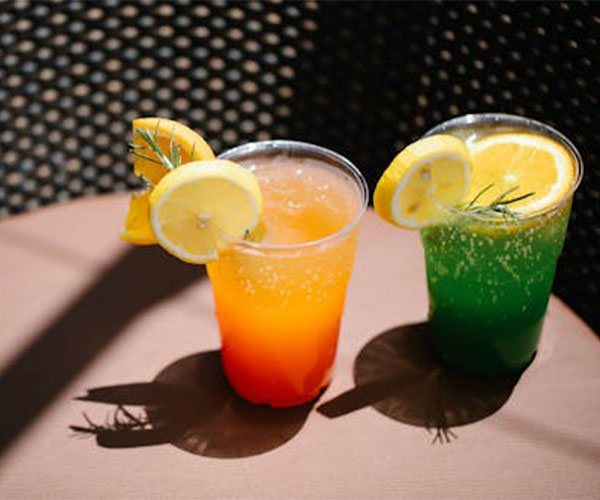
As we conclude our discussion on managing hard water in countertop ice makers, we encourage you to further explore your options and make well-informed decisions to enhance your ice-making experience. By taking proactive steps, you can ensure your appliance performs optimally even in challenging water conditions. https://amzn.to/3WoePQf
- Explore Detailed Reviews: We recommend checking out detailed reviews of ice makers specifically designed to handle hard water. These reviews can provide valuable insights into which models are best equipped with features like advanced filtration systems, self-cleaning functions, and durable materials resistant to scale buildup. Understanding the strengths and weaknesses of different models will help you choose an ice maker that meets your specific needs.
- Share Your Experience: If you currently use a countertop ice maker with hard water, we invite you to share your experiences. How has hard water affected your ice maker’s performance? What steps have you taken to mitigate these effects? Your stories and tips can be immensely helpful to others facing similar challenges. Join the discussion in the comments section below or on our social media platforms to help build a community of informed users who can learn from each other’s experiences.
References
- GE Profile Opal Nugget Ice Maker Product Page
- NewAir Countertop Ice Maker Product Page
- Igloo ICEB26HNBK Portable Electric Countertop Ice Maker Product Page
- Scotsman SCN60PA-1SS
- EUHOMY Nugget Ice Maker Countertop
- Silonn Ice Maker Countertop
Additional Resources
- [How often should you clean your countertop ice maker?]
- [What happens if you don’t clean your countertop ice maker regularly?]
- [How does a countertop ice maker work?]
- [How to install a countertop ice maker?]
- [How often to descale a countertop ice maker?]
- [Buying Guide: Countertop Ice Makers with Water Line Connection]
- [Kitchen Upgrade Ideas: Countertop Ice Makers with Water Line]
- [Which countertop ice maker with freezer is best?]
By engaging with our content, reading reviews, and participating in community discussions, you can better navigate the complexities of choosing and maintaining an ice maker in hard water areas. Whether you are considering a new purchase or looking to improve the lifespan of your current machine, staying informed and connected will undoubtedly yield the best results.

